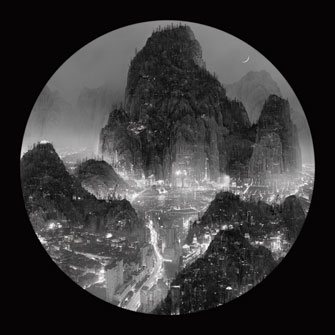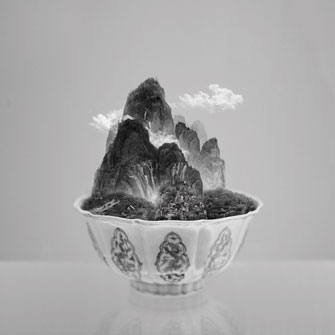A Beautiful
Vision of Hell

“The Moonlight, Waxing Crescent Moon” (2012). © Yang Yongliang. Courtesy Galerie Paris-Beijing
For centuries, artists have been inspired by Hell. As a creative font, human suffering has probably only been rivaled by figures of redemption like the Virgin Mary and the Buddha. Yet to the modern mindset, wary of literal readings of the scriptures and ever less inclined to believe in flesh-and-blood devils, visions of the netherworld seem increasingly out of touch, hyperbolic, even comical.
Chinese artist Yang Yongliang reclaims the theme, revitalizing it and imbuing it with fresh significance. His efforts are the latest to be recognized, in the exhibition “Yang Yongliang: The Silent Valley,” by the Galerie Paris-Beijing in the Marais, which previously played host to a well-camouflaged Liu Bolin in a space that is well worth discovering if you are in the area.
Though lacking in theological overtones, Yang’s art offers images of Hell that resonate strongly with the situation of society today. Using a combination of photography and digital manipulation, he generates projections of what tomorrow’s cities could look like. The results – disheartening, gloom-laced and aesthetically abhorrent though they may be – are compelling. Shapes that at first look like mountains reveal themselves, upon closer inspection, to be colossal skyscrapers; structures that resemble trees crystallize into pylons as you study the photograph. These are cities entirely stripped of nature, colonized and invaded by the human species to their last square inch.
Some of Yang’s megalopolises arise improbably from Chinese crockery; others are seen from afar, from the perspective of a guru dressed in flowing white. The contrast between old

“A Bowl of Taipei n. 2” (2012) © Yang Yongliang. Courtesy Galerie Paris-Beijingand new, traditional and urban, could not be more pointed (indeed, it is possibly a little too pointed). Such is the intricacy of the graphics, however, that any heavy-handedness ceases to register above the gravity of the warning voiced. Unless something is done to control the spread of man, Yang implies, we will murder our planet.
Somewhat miraculously, the collection manages not to be exclusively depressing. There is some old-fashioned detective fun to be had in front of those photographs whose titles suggest the incognito presence of such objects as grenades or guns. The artifacts concealed among the detritus of infernal suburbia encourage the visitor to spend more time in front of the images – a sobering experience, certainly, but also one which is morally strengthening. In fact, such is the bleakness of the photographs that release from the gallery into the Parisian daylight engenders intense relief and gratitude – and hopefully, too, the resolution to take more seriously the ecological dangers threatening our planet.
Galerie Paris-Beijing: 54, rue du Vertbois, 75003 Paris. Tel.: 01 42 74 32 36. Open Tuesday-Saturday, 11am–7pm. Through May 11. www.galerieparisbeijing.com
Reader reaction: Click here to respond to this article (your response may be published on this page and is subject to editing).
Please support Paris Update by ordering books from Paris Update’s Amazon store at no extra cost. Click on your preferred Amazon location: U.K., France, U.S.
More reviews of Paris art shows.
© 2013 Paris Update
